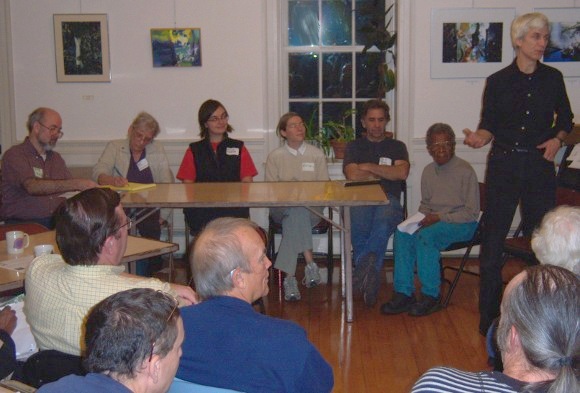In a spirited, harmonious opening session of the joint National War Tax Resistance Coordinating Committee Fall gathering / 25th annual New England Gathering of War Tax Resisters and Supporters, more than fifty war tax resisters from across the country (and a few WTR-curious from the Boston area and elsewhere) gathered at the Cambridge Friends Meeting house .
The rare joint gathering started with a panel session. I took some notes along the way, but got carried away by the back-and-forth and the ideas and sometimes forgot to jot things down.
Local resister Mike Prokosch started things off by emphasizing what military spending costs us in terms of opportunity costs — that is, what things of common benefit we could be funding but are neglecting because of our pathologically bloated military spending. He suggests that the future of an organized war tax resistance movement means “organizing on the basis of interest, not ideology.” We need to find out whose ox is being gored when money is siphoned out of communities and into the Pentagon and appeal to them to join us based on, if not common objectives exactly, at least a common enemy.

Mike Prokosch addresses the gathering
Long-time war tax resisters Juanita Nelson and Bob Bady spoke next, giving an overview of the birth and growth of the modern American war tax resistance movement, from Ernest Bromley’s refusal to buy a tax stamp for his car during World War Ⅱ, to the founding of the Peacemakers in , through such highlights as the IRS siege of the Kehler/Corner house, to the present day. Nelson told the story of being hauled off to jail in her bathrobe back in the day. She says that in all of the decades she’s been resisting, the IRS has only gotten $4 out of her, when part of her pay as a model was withheld. She also expressed that the war tax resistance community in her neck of the woods “has dwindled… now we’re half a dozen people meeting every other month.”
Bady suggested that a key to becoming a more effective and powerful movement is to speak up more. Too many war tax resisters, he says, are satisfied with feeling that they have a clean conscience and are content to stay safely quiet, under the radar. We need to make more noise and be more of a friction to wear down the mechanism of the war machine, which will also help us to get the attention and support of other activists.
Ruth Benn explained what the National War Tax Resistance Coordinating Committee is, how it operates, and the range of philosophies and methods used by its members. This was old hat to me, so I didn’t take many notes, but it was an eye-opener I’m sure to some of the newbies or to those who are locally- or regionally-focused and don’t give much thought to the national organization.
Erica Weiland spoke of how she came into war tax resistance after a frustrating time trying to work within a peace movement that seemed to be counterproductive when it was productive of anything at all. Hers is one of my favorite “salvation narratives” because she always mentions The Picket Line as one of the things that helped her take the plunge into being a war tax resister.
Katherine Fisher spoke next of how her decision to become a war tax resister grew out of her joining and working within the Society of Friends. She says that when she was still in school, she heard some people from the New York Yearly Meeting (I think it was) talk about war tax resistance and she filed it away as something she’d need to consider. Since she was still a dependent on her parents’ tax returns, the concern wasn’t urgent for her, but when she got out of school and got a full-time job she had to confront her choice. She decided that she would refuse to pay her taxes to the government but would instead put the money in a war tax resisters’ escrow account and would write to the IRS to explain her position. First, though, she took this tentative decision with her to a “clearness committee” in her Quaker meeting that she had asked to help challenge and clarify her decision. She spoke of this process, and of the support she got (and continues to get) from her meeting throughout. It was an inspiring, interesting, and well-told story, and a helpful contrast to the many go-it-alone stories of tax resistance that one commonly hears.
Earlier in , a handful of us who are on the administrative committee of NWTRCC got together to do business. I’d love to share with you some insider tidbits of what goes on in our chamber of sedition, but… you’d be bored to tears. One of these days we’ll have to put some sinister plot on the agenda, but as it is we mostly were talking budget, fundraising, schedules, objectives, who is going to be moderating what part of what discussion, and so forth — like just about any other small organization. Useful stuff, certainly, for making the more interesting parts of the larger meeting flow smoothly, but not in itself the sort of stuff to get your blood racing.
